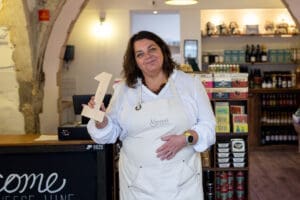

SmallBiz100 Spotlight: Victoria’s Cheese – Artisan Delight in the Heart of Ely
As part of my SmallBiz100 celebrations, I’ve been sharing the limelight with some of the incredible small businesses I’ve worked with. One that instantly comes to mind (and makes my stomach rumble) is Victoria’s Cheese in Ely.
If you’ve ever wandered through Ely and stumbled across a cosy little cheese shop with a cellar feel and centuries of history in its walls, you’ve found it!
But Victoria’s story didn’t start with a shop.
From Cheese Counters to Cheese Boxes
Before going solo, Victoria worked with cheese for other people. After a couple of difficult experiences she suddenly found herself without an outlet for the passion she’d developed.
“I just found myself with no outlet for this new passion I’d got,” she told me, “so I decided to put it online, a local monthly box delivery around East Anglia.”
Her first curated cheese box went out in March 2024. Just eight months later, she opened the doors to her own shop.
“It just exploded,” she said. “I opened the shop in November and it all moved so fast.”
That leap from local cheese box to bricks-and-mortar shop in under a year says everything about the appetite for what she’s doing and how much heart she’s poured into it.
Why Ely?
Ely wasn’t a random choice. It’s a city that loves good food and fiercely supports its independents.
“Ely’s a really foodie venue now,” Victoria explained. “It’s got Foodie Fridays, a great market culture, and people who genuinely like to shop small and care about the provenance of their food.”
There’s a personal link too, Victoria and her partner Paul met in Ely, and have friends and history there. She often bumps into people she went to sixth form with or family friends of Paul’s.
“It feels like home,” she said. “My neighbours on the high street are lovely, the small businesses support each other – it’s a really supportive community.”
A Cheese Shop in a Former Monks’ Mortuary (With a Ghost?)
The shop itself is a bit special.
Their original premises fell through at the last minute. Then a friend spotted the current building becoming available. A historic space believed to have been the monks’ mortuary and bone store, tucked into the cathedral estate.
“Everyone says things happen for a reason,” Victoria laughed. “The other shop fell through because this one was waiting.”
With crypt-like ceilings and a cellar-style atmosphere, it’s exactly the setting you’d dream up for a cheese and wine shop.
“There’s supposed to be a ghost,” she admitted. “A few things have happened that make me think maybe there is. I’m very open-minded!”
A Lifelong Cheese Lover (Cheese Over Pudding, Always)
Victoria grew up around good food, raised in hotels where quality ingredients and proper cooking were normal.
“I’ve always loved cheese,” she said. “If we were out, I’d always choose cheese instead of pudding. I didn’t get a sweet tooth until after I had babies.”
What really pulled her deep into artisan and small-batch cheese again was a cheese from Becky at Wilton Farm – particularly the Wissington, a hard sheep’s milk cheese. That rediscovered spark is what now fills her counter.
Her fridge is mostly British, with local and UK-wide cheeses alongside a handful of Continentals.
“I wouldn’t be showcasing the best small producers if I didn’t bring in a few special ones from elsewhere,” she said. “I want to introduce people to cheeses they might not experience anywhere else.”
When I asked if she had a favourite cheese, she laughed.
“That’s like asking me which is my favourite child. It depends on the day – and how they’re behaving!”
But she did admit, “If I could only eat one cheese for the rest of my life, it would be Norfolk White Lady. You can eat it at different ages and get different flavour profiles – and I adore Becky and her cheese.”
Regulars, “Victoria’s Cheesies” and a Loyal Little Team
The most rewarding part of the past year?
“The feedback from customers,” she said instantly. “On Saturday, people were bringing me gifts and telling me how much they love my little shop. I think with any small business, it’s seeing your customers happy.”
She’s built a loyal base of regulars who come in week after week – some of them every single week since opening.
“They’ve become like a little family of Victoria’s Cheesies,” she smiled.
She’s also created work for four other women, all part-time, all still with her from the beginning.
“It fits their lifestyles, and that really pleases me,” she said. “I love that I can give them that.”
Hidden Gems in the Counter
If you’re wondering what to ask for when you visit, Victoria has a few recommendations.
“The St. Jude and St. Cera cheeses are amazing,” she told me. “They come in little tubs and people sometimes hesitate, because it feels like a lot to spend on one cheese. But if I can get them to take it home, they always come back.”
She’s also excited about two brand new cheeses from a maker who’s only been producing for a few months.
“He’s chosen a handful of cheesemongers to work with and I’ve managed to get in with him. They’re absolutely sensational – they’ll be in the fridge very soon.”
A Day in the Life of a Cheesemonger
So what does a typical day look like?
Victoria is usually in the shop by 7:30am. On bread days, she’s in Ely by 7am collecting fresh loaves from her microbakery collaborator, Bread By Neil. Once she’s in the shop, it’s environmental health checks (including a lot of pest and cleanliness checks in the old building), deliveries, paperwork and prep before opening at 9 or 10am.
From there, it’s pretty much full-on.
“There’s a lot of cutting, wrapping and serving,” she said. “We don’t close for lunch. If one of the girls is in with me, they’ll handle the bits around the counter or cover for me when I’m doing paperwork.”
Afternoons are often for ordering – each supplier has different order days – and then there’s the evening clean-down.
“We have to disinfect everything – floors, worktops, tools – and record it all. There’s a lot of paperwork involved, just in selling cheese day to day, on top of the normal small business admin.”
She’s usually home around 5pm, cooking tea for Paul, with most of her work life contained in the shop.
“He takes care of all the aprons – washing, ironing – so I can leave most of it at the door.”
Challenges You Wouldn’t Expect
The biggest challenge?
“Wastage,” she said. “Trying to anticipate how much cheese I’ll need for a weekend. Am I going to run out or be left with loads I can’t do anything with?”
Because she isn’t allowed to cook on site, she can’t simply turn leftovers into toasties or baked dishes to sell. That means careful ordering – and a strong dislike of throwing food away.
“At Christmas I slightly over-ordered,” she admitted. “I had a few whole Stiltons and some Brie left. It sounds a lot, but given how much we’d gone through, it wasn’t bad. I gave some to charities – one used the Stilton for soup at a night shelter – and the rest went to locals or into the freezer. I’d rather give it away than waste it.”
At home, she jokes they have “enough cheese sauces for five years” thanks to the holiday fridge clear-out.
Cheese Lock-Ins, Lazy Sundays and Growing Online
The future is looking busy. Her monthly cheese lock-ins – after-hours tastings in the shop – have been such a hit that they sold out for the entire year within weeks.
“I always have people asking if there are spaces left,” she said. “Next year I’m hoping to keep the evening lock-ins, but also introduce a lazy Sunday afternoon session. We’ll close at 3pm and then have a two-hour cheese and wine tasting. I think there are a lot of people like me who’d rather do that on a Sunday afternoon than in the evening.”
She’s also planning to develop the webshop as a stronger second income stream, making it easier for people to order online while staff can pack boxes during quieter periods.
And of course, there’s Christmas.
Christmas orders open early and fill fast.
“Christmas is what pays for January and February,” she said. “No one wants cheese in January – they think they’ve had too much at Christmas!”
Solid Small-Business Advice
When I asked what advice she’d give to someone starting their own small business, she didn’t hesitate:
Have a contingency fund.
“Everything will be more expensive than you think. There will always be hidden costs. When business rates went up, it was terrifying – I wondered if I was going to fail in the first year.”
Keep a buffer in the bank.
“I have a level I don’t like to go below. It lets me sleep at night.”
Pay suppliers promptly.
“The cheese I sell this weekend – I’ll pay for on Sunday. I don’t like to owe money. It also builds good relationships with suppliers.”
Stay on top of the accounts.
With an accounting background, Victoria keeps her books up to date two or three times a week. Her year-end was ready for the accountant almost immediately.
“Otherwise, you drown in it,” she said. “It’s better to spend half an hour regularly than let it pile up.”
Where to Find Victoria’s Cheese
📍 28A High Street, Ely
🌐 www.victoriascheese.co.uk

